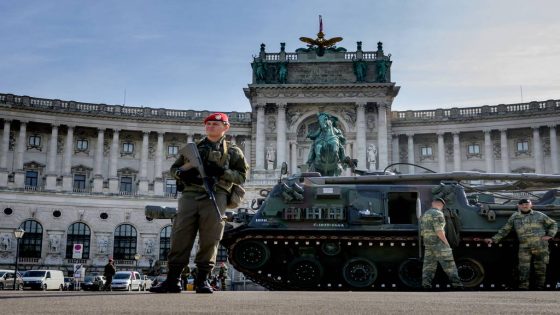GRAZ, Austria – The halls of Vienna’s Hofburg, the former imperial palace central to the Austrian government, have been home to proud talk of “perpetual neutrality” ever since the Alpine republic’s founding from the ashes of World War II. Chancellors, presidents and ministers alike will speak of the obligation to serve as a global mediator and of Austria’s unique position as a bridge between the East and the West.
But simultaneously, Austria has supported European weapons deliveries to Kyiv, authorized sending the military to the Red Sea and has deepened defense cooperation with its Western European NATO neighbors.
Experts speaking to Defense News raised questions as to how much longer the self-proclaimed “island of the blessed” – a phrase uttered by Austria’s longest-serving chancellor in the 1970s – would be able to straddle the line between taking sides politically and maintaining a convenient status of military ambiguity.
Questions about Austrian neutrality have come to the fore since Russia’s 2022 full-scale invasion of Ukraine, catapulting neutrality into the center of attention and touching a nerve in public discourse.
With Sweden and Finland abandoning longstanding traditions of non-alignment and joining NATO, Austria is now one of just three European Union countries – alongside Ireland and Malta – that consider themselves neutral.
Deep roots
Austria’s neutrality is particularly tenacious because it has been enshrined in the country’s own constitutional law since its full independence from the Allies in 1955. It prohibits the country from joining military alliances and hosting foreign bases.
“Not even Switzerland’s neutrality is as thoroughly based in law,” said Heinz Gärtner, chairman of the advisory board of the Vienna-based International Institute for Peace and a senior advisor to the Austrian armed forces. Unlike cases where a national government simply declared itself neutral to the rest of the world, this means that Austria’s government remains bound by the provisions of the neutrality law.
While “perpetual” – meaning it applies both in times of war and peace – it is not irrevocable. A parliamentary supermajority would be needed to lift the dogma.
In the EU, Austria’s position is unique, as Malta’s and Ireland’s neutrality are based on bilateral treaties, explained Gärtner.
“But our neutrality is not equidistant, and it is not a neutrality of values,” he said. “One can – and one must – have values.”
Gray zones
“What is and isn’t compatible with Austrian neutrality has changed a lot over the years,” said Peter Bußjäger, a legal professor at the University of Innsbruck who testified in parliament on the issue in a hearing last year. He called the Austrian approach the “avocado doctrine” – a hard core of the legal neutrality requirement stays consistent, but the rest depends on the context. “This hard core hasn’t gotten any less hard since the war in Ukraine,” he said.
Perhaps the most significant change to Austrian neutrality came from the country’s membership in the European Union.
“The public likely isn’t aware of the extent to which the constitutional [neutrality] law has been hollowed out,” said Christoph Schwarz, a research fellow with the Vienna-based Austrian Institute for European and Security Policy.
Article 42 of the European Union’s treaty serves as a mutual defense clause – effectively making the bloc a military alliance in the event of an attack. Although a carveout exists specifically for neutral member states to apply this clause in accordance with the “specific character of [their] security and defense policy,” as the provision goes, legal experts agreed that a real-world armed crisis would compel Austria to walk back some of its neutrality.
In fact, Austria’s constitutional law was amended for its accession to the union, promising full participation in Brussels’ joint security and defense policies and placing EU law above Austrian law.
Experts like Schwarz see a growing divide between public opinion and the perceptions of experts on the question of what the status means to Austria today and in what direction it should develop in the future.
There has been strikingly little public discussion on the current limitations of neutrality and its future, he said. All parties represented in parliament publicly support the status quo except for the liberal Neos party, whose members have been more daring in calling for at least a review of Austria’s policy alongside deeper integration with NATO.
But doing so would come with a high political cost. In a government-sponsored poll from March of 2022, 91% of Austrians said that neutrality was important to them personally.
“A lot has happened without public discussion,” said Schwarz. “The accusation that our politicians have tied Austria up in European structures behind people’s backs – there’s not much I could say to counter that.”
Mission-ready?
“Both norms exist alongside one another,” said Bußjäger, the law professor, referring to the concept of neutrality in Austria’s constitution and the subsequent EU integration commitment. “Legally speaking, it has derogated the constitutional law on neutrality.”
What this means in practice is that Austria can – and said it would – participate in EU-led military actions, even military missions. On March 6, the government authorized the deployment of Austrian military personnel to the Red Sea “under the framework of the joint security and defense policy of the EU,” as a parliamentary press release put it.
“Ultimately, everyone can interpret the legal framework in the way that suits them best,” said Schwarz.
The government can avoid racking its brains about this challenge until the EU is directly involved in a war, said Schwarz, who conducted a survey of policymakers on opinions about neutrality in 2023.
“The message is: We’re neutral, we’re kind, we keep out of everything that happens around us and we only contribute to sanctions, take in a few refugees and sometimes send a few helmets somewhere,” he said.
Legally, Austrian neutrality would not prevent the country from contributing to the EU’s planned Rapid Deployment Capacity, which is expected to reach full operational ability by 2025. Vienna has thus far supported the scheme fully, including being one of nine countries contributing troops to the first EU-level live military exercise in 2023.
The plan will allow the EU to quickly deploy up to 5,000 troops in response to crisis situations. It was first announced in the EU’s 2022 Strategic Compass as a force to be “used in different phases of an operation in a non-permissive environment.”
Austria’s role in the initiative could become a turning point for country, argues Bußjäger. “Participating in some form of an intervention force? That would no longer be compatible with neutrality,” he said. “That’s a military alliance.”
Calls for clarity
More than 86% of the experts polled in the AIES’s 2023 study said it was “very” or “absolutely” necessary for Austria to clarify what sort of support it would provide in the case of an attack against a fellow EU country. Similarly, 72% said that in the medium to long run, the tensions between deepening European defense solidarity and Austrian neutrality would be “unresolvable.”
A majority of experts also supported investing more heavily into Austria’s armed forces while deepening ties with NATO. The current Conservative-Green coalition government has done both.
Later this year, Austria is set to hold its largest military exercise in a decade, hosting troops from half a dozen partner countries in the process. Its military planners have repeatedly stressed the need for interoperability and closer cooperation with NATO, including most recently in the context of Sky Shield air defense acquisitions.
Vienna’s accession to the German-led initiative brought a flareup of public debate about Austrian neutrality. “The reflexive response was to say: Austria is participating in something military, so our neutrality is being dismantled,” said Schwarz. “Even though, ultimately, it was mostly a procurement question.”
The Austrian government argued that because the ultimate decision to engage targets under Sky Shield would remain in Vienna, the project was compatible with the country’s requirement of staying out of military alliances.
Ultimately, the war in Ukraine, which has prompted the European Union to beef up its defenses, has led to some serious soul searching here.
“Who are we, what are we allowed to do, what do we want? These are questions that need to be answered and for that, we need more public education about the topic,” said Schwarz.
Back to the future
Austria’s neutrality experienced its heyday in the 1970s under the widely popular and internationally assertive social democratic government of Chancellor Bruno Kreisky. As international organizations such as the United Nations and International Atomic Energy Agency flocked to Vienna, the Chancellor launched diplomatic and peacebuilding initiatives around the world – including being an early and vocal advocate for a two-state solution in the Middle East.
Then Kreisky was ousted and the country’s foreign policy lost its stride. What was once rightly called “aktive Neutralitätspolitik” – an active policy of neutrality – gave way to a much less productive and daring role for Austria in the international sphere.
Combined with lackluster investment in the military, it led to the still-ongoing indignation among other European countries at Austria’s “free-riding” of neighboring NATO’s protection, as journalist Karl-Peter Schwarz put it.
“There is no perspective for an active policy of neutrality,” said Bußjäger. A half-hearted attempt to assume the role of mediator only caused consternation in the West when the Austrian chancellor Karl Nehammer flew to Moscow for what he called “tough” talks less than two months after the invasion of Ukraine and just days after his own visit to Kyiv. But the bombs in Ukraine kept falling, and Putin did not sit down for negotiations with Ukrainian president Volodymyr Zelenskyy on terms acceptable to Kyiv. The initiative seems to have ended there.
But to some, an enthusiastic return to the Kreisky administration’s assertive foreign policy of the ‘70s seems like the only way to preserve Austrian neutrality, especially in the light of mounting challenges.
Gärtner, the advisor to the Austrian ministry of defense, said neutrality only works if it is “credible and useful.”
It’s the usefulness part of the equation where he sees Austria lacking.
“As a small, neutral state, you must always show that you can be useful or provide some sort of good services, like Switzerland does,” Gärtner said. “Otherwise, the great powers will forget you.”
Linus Höller is a Europe correspondent for Defense News. He covers international security and military developments across the continent. Linus holds a degree in journalism, political science and international studies, and is currently pursuing a master’s in nonproliferation and terrorism studies.
Source Agencies


